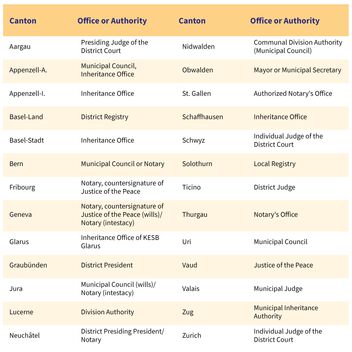
Apply for an inheritance certificate: here’s how it works
An inheritance certificate is the official document confirming your entitlement to an inheritance. This proof, i.e. inheritance certificate or proof of inheritance, plays a key role in inheritance management. For example, it enables you to withdraw money from the deceased's account.
Our experts at AXA-ARAG answer the key questions about an inheritance certificate: Who needs one? Which forms are required? All the details can be found here.
Inheritance certificate: form obtainable from the authorities
In Switzerland, the application form for an inheritance certificate can often be downloaded from the websites of the responsible cantonal authorities. If this isn't possible, you can simply ask for the requisite document by email. The following agencies are responsible for issuing inheritance certificates in Switzerland:

Upon download or receipt, complete and return the form together with all necessary documents (usually the death certificate and other evidence such as the will, disclaimers of inheritance etc.) by mail to the relevant authority.
The authorities charge a fee for issuing an inheritance certificate which varies from canton to canton and depends on the amount of inheritance. This fee can be between a hundred or several thousand Swiss francs, but the judgment fee is rarely less than CHF 250.
Did you know?
The inheritance certificate may be issued as soon as the group of persons entitled to the deceased person's estate has been definitively determined, but no earlier than one month after the reading of the will. If there is no will, you may apply for the inheritance certificate immediately after the death of the deceased. However, the inheritance certificate is only issued if the disclaimer period has expired or the inheritance has been accepted by everyone.
Inheritance certificate: what are my rights and obligations as an heir?
You have rights as soon as the inheritance certificate has been issued, including the right to dispose of your inheritance as you see fit. If you're part of a community of heirs, decisions about the inheritance must be taken jointly by that community. Nothing can therefore be undertaken without your agreement. Conversely, you are obliged to represent the interests of the other heirs and are not permitted to do anything without their agreement.
How does that work with the probate court?
If you're appointed as an heir, the probate court advises you of this. You then have three months to decide whether to accept or decline the inheritance.
If you accept the inheritance, you must submit a declaration of acceptance to the court. Failure to do so means that the authorities and agencies can only issue the inheritance certificate after the three-month period has expired.
Can I access the estate without an inheritance certificate?
Under Swiss inheritance law, you as an heir are not obliged to apply for an inheritance certificate. However, you are not permitted to access the estate, i.e. the assets, unless you have the inheritance certificate. Without it, you have to wait until the process to divide the estate has been officially completed. Only then are you entitled to access your inheritance without an inheritance certificate.
If the bank learns of a death, the standard procedure is as follows:
- Custody accounts and accounts are blocked.
- They can be unblocked with an inheritance certificate.
- Only an inheritance certificate gives entitlement to access the accounts.
Without an inheritance certificate, only bills may be settled that relate directly to the death, such as funeral costs.
Should I apply for an inheritance certificate if I want to decline the inheritance?
No, if you wish to turn down the inheritance, you cannot apply for an inheritance certificate. If you did, this could be seen as interference and could mean that you lose your right of renouncement.
To find out the amount of inheritance or the value of the estate, you can apply to the court for a Certificate for Information. This enables you to gather information from authorities and banks about the deceased person's financial circumstances.
An alternative is for the heirs to ask for a copy of a public inventory. The period for doing so is one month, beginning from the date on which you learned of the death. This application may only be made by heirs who have not yet made any official decision about whether to accept or decline the inheritance.
Can all heirs apply for an inheritance certificate?
Yes, all heirs are entitled to do so, i.e. legal heirs who are normally related to the deceased as well as appointed heirs who are unrelated. However, those receiving a bequest cannot apply for an inheritance certificate. A bequest means the gifting of specific items from an estate, such as real estate, securities, jewelry, works of art or a fixed amount, but without conveying the status of an heir.
What is the inheritance certificate used for?
This document is purely temporary, but confirms that the persons named in it are recognized as heirs. This also means that they may access the inheritance.
What is a Certificate of Succession?
The European Certificate of Succession simplifies the cross-border processing of inheritances and can also be recognized in Switzerland.






